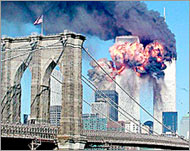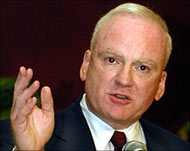Rice faces 9/11 grilling by inquiry
The US national security adviser, Condoleezza Rice, faces an awkward test when she testifies publicly before the commission investigating the 9/11 attacks – accounting for a litany of contradictory statements and dubious claims.

Amid a growing controversy over how the White House has prosecuted its “war on terror”, Rice faces the National Commission on Terrorist Attacks upon the United States on Thursday.
Allowing her public testimony represents a breathtaking U-turn by the White House. President George Bush initially refused to subject Rice to a public hearing before a commission conceived by Congressional legislation – though picked by the president – arguing this would compromise the constitutional separation of powers.
“A president and his advisers, including his adviser for national security affairs, must be able to communicate freely and privately without being compelled to reveal those communications to the legislative branch,” President George Bush said last month.
But on 1 April, Bush said that Rice would be allowed to testify publicly – as long as her appearance did not set a legal precedent. “I’m looking forward to Condi testifying,” Bush said earlier this week.
 |
|
President Bush (L) changed his |
The extraordinary reversal acknowledged that Rice’s rejection of an open hearing had become a public relations disaster, amid controversial accusations levelled against the national security adviser and her colleagues by former White House counter-terrorism chief, Richard Clarke.
Gayle Smith, a senior fellow at the Washington-based American Center for American Progress, a liberal thinktank that has documented Rice’s “unsubstantiated and contradictory assertions”, says it’s hard not to conclude that some of what Rice has been saying is false.
“It’s as much sloppiness as anything else,” Smith told Aljazeera.net. She says the White House policy of arguing its case through the media rather than before the commission has contributed to Rice’s long list of “misstatements”.
Wrong war
Clarke testified before the 9/11 commission on 25 March, saying that the Bush administration had ignored the threat from al-Qaida and used the 9/11 attacks to launch “the wrong war” against Iraq.
Consequently, Bush has undermined the campaign against America’s most urgent enemies, he says.
Clarke’s accusations strike at the very heart of Bush’s campaign message in an election year – that he is the best candidate to protect the country from its enemies.
A Los Angeles Times survey published last Thursday found 52% of Americans agreed that Bush had failed to take the threat of terrorism seriously enough before 9/11.
Rice now has the opportunity to rebut Clarke’s accusations, correct some admitted “misstatements” and set the record straight.
The trouble is, her own record of statements and claims clearly conflicts with established facts and the testimony of others.
Preventing 9/11
The Bush administration’s defence that it cannot be blamed for not preventing the 9/11 attacks is premised on its insistence that the attacks could not be foreseen and it did not receive sufficiently specific warnings.
“I don’t think anybody could have predicted that they would try to use an airplane as a missile, a hijacked airplane as a missile,” Rice said on 16 May 2002.
 |
|
Rice says the 9/11 plane attacks |
She reiterated that claim in a Washington Post article on 22 March 2004, saying “we received no intelligence that terrorists were preparing to attack the homeland using airplanes as missiles”.
But Rice may find it difficult to explain the Mass Casualty exercise of 24 October 2000, in which the Defence Department co-ordinated an emergency services response to a mock scenario wherein a hijacked aircraft crashed into the Pentagon – one of the actual targets on 11 September 2001.
Moreover, a former translator for the FBI with high security clearance says Rice’s assertion is “an outrageous lie”.
Sibel Edmonds told reporters last week she had supplied the 9/11 commission with information proving senior officials knew of al-Qaida’s plans to attack the US with aircraft months before the strikes happened.
Edmond’s testimony has received little attention from the major US news providers but echoes previous media reports.
On 6 August 2001, the president “received a one-and-a-half page briefing advising him that Usama bin Ladin was capable of a major strike against the US, and that the plot could include the hijacking of an American airplane”, the NBC network reported on 10 September 2002.
Assessing threats
Another conflicting claim came in May 2002, when Rice suggested Bush had not received an explicit warning about plane attacks but had requested a CIA briefing because of his concern about elevated “terrorist” threat levels in the summer of 2001.
But the CIA has informed the 9/11 commission that Bush requested no such briefing, which was generated by the intelligence agency itself.
Countering Clarke’s charge that the Bush administration did not take the threat from al-Qaida seriously enough, Rice insists the White House was already planning to strike the group and its Taliban hosts in Afghanistan before the 9/11 attacks.
In her Washington Post article, Rice wrote that the plan “called for military options to attack al-Qaida and Taliban leadership, ground forces and other targets”.
But the national security adviser has been contradicted by her own colleague, Deputy Secretary of State Richard Armitage, who has told the commission such military plans were only drafted after the 9/11 attacks.
Setting priorities
Similarly, Rice has consistently maintained that tackling terrorism was a priority from the day the administration took office.
But her contention seems bizarre when set against the fact that Clarke’s former job – national coordinator for counter-terrorism – was downgraded from its cabinet level rank when Bush entered the White House.
 |
|
Richard Clarke says Bush did not |
Rice also says Clarke had several opportunities to warn the administration “but failed to do so”.
But Clarke sent a memo to Rice’s aides on 24 January 2001 marked “urgent” that requested for a cabinet-level meeting to deal with an impending al-Qaida attack. No such meeting was granted until one week before the 9/11 attacks.
In her 22 March article, Rice also insisted the administration received no plans to tackle al-Qaida when it took office.
Yet the 9/11 commission has already found that “Clarke forwarded his December 2000 strategy paper and a copy of his 1998 Delenda plan to the new national security adviser, Condoleezza Rice” on 25 January 2001.
Moreover, a major national security speech Rice had been due to give on 11 September 2001, which the Washington Post published on 1 April, stressed missile defence as the basis of the administration’s policy – and made no mention of al-Qaida or Usama bin Ladin.
Iraq obsession
Crucially, Rice has struggled to counter Clarke’s assertion that the White House was preoccupied with Saddam Hussein and tried to use 9/11 to justify toppling him.
After repeated denials by White House officials, Rice confirmed on 28 March that Bush had indeed instructed Clarke to “see if Saddam was involved” with 9/11.
Soon afterwards, the president directed the Pentagon to begin planning for an invasion of Iraq, and Defence Secretary Rumsfeld told aides to draw up similar plans.
Clarke’s accusations are backed up earlier assertions by former Treasury Secretary Paul O’Neill, who spoke of Bush’s obsession with Iraq from the first days of his administration at the expense of focusing on Usama bin Ladin and al-Qaida.
It remains to be seen whether the 9/11 commission – which has complained of official obstruction – can get to the bottom of what the White House knew, when it knew it, and whether it acted appropriately.
“The commission has had its hands tied – by the less-than-full cooperation by the administration,” says Smith. “But it has followed this with tremendous detail and is doing the best it can under the circumstances.”